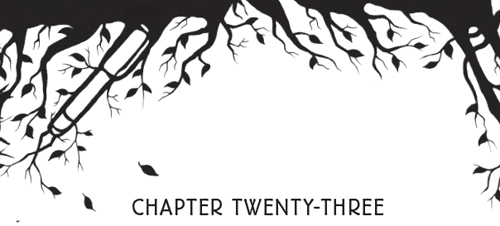Margaret
2014
THE PLACE GRANDPA JOSHUA chose for the meeting with Lucas Biggs was a park on the edge of town, a rectangle of green and trees, redwood picnic tables and benches, a swing set, a few barbecue grills and volleyball nets, everything painted and kept up, but nothing fancy.
Charlie and I had been there when we were smaller, had played hide-and-seek among those very trees, without having any idea of what used to be there. How could we? There was no bronze statue, no historical marker commemorating the four Martinelli children’s beautiful black eyes or Preston Garrett’s fingers flying over a piano keyboard. No one ever took an educational field trip there to hear a guide tell the story of bullets tearing apart the lives of innocents or of a man who wouldn’t stop talking about fair play and peace.
But as I walked across the grass with Grandpa Joshua and Charlie, it occurred to me that someone somewhere had cared enough to make sure it hadn’t been paved over, turned into a strip mall or a parking lot. Someone had planted trees.
Canvasburg.
Canvasburg, now full of kids’ games and family cookouts, cupcake icing melting in the sun; some of the adults banging around a volleyball with the kids; some of them sitting at picnic tables or under trees, talking, with babies against their shoulders or with little ones asleep in their laps. A safe place. A family place. Maybe this was okay after all. Maybe it was even a kind of justice.
We didn’t hide. The place was so busy that we didn’t have to. Grandpa Joshua, Charlie, and I were just another family under a tree, soaking up the sound of laughter and the late-spring sun. Charlotte sat at a picnic table by herself, reading a book, waiting for Lucas Biggs. We were all waiting for him, with our hearts in our throats, waiting for Lucas Biggs, inside whom there was at least a tiny bit of Luke Agrippa, shining like a light, or so we hoped.
Charlotte had told him five o’clock. He hadn’t said yes or no or much of anything at all. Five o’clock came and went. So did 5:10. Then 5:15 crept up and slipped past. By 5:30, Charlie, Grandpa Joshua, and I had given up on our forced conversation. By 5:40, I was fighting back tears.
Then, at 5:41, there he was, wearing a suit and tie in the evening, making his way across the grass. He moved slowly but steadily, with long strides, and for a second, I could glimpse the athlete he used to be. I saw Charlotte stand up. I saw him walk toward her and stop, a few feet away. I started to walk, too, the quilt square in my hand, but Grandpa Joshua caught me gently by the elbow, pulling me back.
“Wait,” he said. “Let’s give them a little more time.”
They didn’t hug, but I saw Judge Biggs lift his hand toward Charlotte’s hair, like he was thinking about touching it, and then he changed his mind. They talked.
“Now,” said Grandpa Joshua.
I walked quickly across the grass, keeping Charlotte between me and the judge, and at the last second, I stepped out from behind her, holding the Quaker star. I saw Judge Biggs’s face begin to go from open to shut, but before he could actually slam the door and hang a Closed sign in the window, I was stretching out my arm, handing him the cloth square.
“Your father was always going to come back to you,” I said, as fast as I could get the words out.
Lucas Biggs took a step back, and my heart sank, but then he reached out his broad hand, the hand that had thrown a football almost to the moon, that had pounded the gavel to quiet the courtroom at my father’s trial, and he took the Quaker star.
Then Charlie was handing him my dad’s magnifying glass, and the two of us were talking at once, pointing out the star shape, the initials, the date.
“‘For Luke,’” read the judge. Then again, “‘For Luke.’”
A change came over Lucas Biggs. He crumpled, got smaller inside his gray business suit, and then Charlotte moved so that she was next to him, her arm steadying him, leading him to the picnic bench, where he sat down, put his father’s talisman on the table in front of him, and stared at it, his fingers pressing down the four corners so he could see the whole thing.
When he looked up, it wasn’t at me or at his granddaughter, but at Grandpa Joshua.
“Josh?” he said. “It’s true?”
“It’s true, Luke,” said Grandpa Joshua. “He loved you. Even when he was up in that hunting lodge trying to make history and change the world, he was thinking mostly about you and what he’d bring back to you.”
Luke stared back down at the Quaker star, and to my amazement, there was the ghost of a smile on his face, not a sneer or a smirk, but a real smile.
“My mother and I made this. I must’ve been about four. The big, zigzag stitches in this corner are mine. It was going to be a whole quilt for my father, but my mother died before we could finish.”
Luke folded his hands into two fists, set them down on top of the square, and rested his forehead against them. He sat like that, his shoulders shaking with silent sobs, as kids ran past and the smell of barbecue filled the air. Grandpa Joshua, Charlotte, Charlie, and I stood by, not talking, not comforting him or even looking at him, just staying, for as long as it took.
